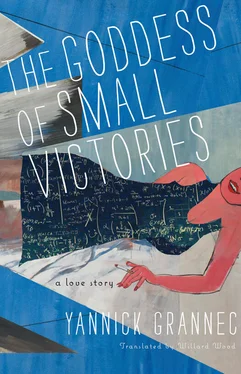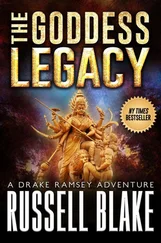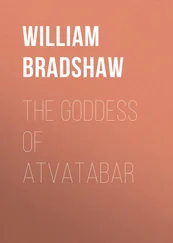“Adele, if your husband could hear you!”
I twirled in a parody of Marilyn Monroe on the subway grate. Penny burrowed in under my skirt; the dog was obsessed.
The husbands over their brandy, the women in the kitchen — all was right with the world. I didn’t object to these sexist interludes; they brought a little fun into my life. These sporadic gusts of social activity were my last real pleasure. Our girl gossip always followed the same reassuring protocol: expressions of maternal pride and concern from my friends, talk of constipation and weight gain from all of us, shopping for clothes, marital recriminations, ending usually with a general indictment of men. Our spouses needed a vat of alcohol or a starry sky to change the world, all I needed was a tub full of dirty dishes.
That afternoon we’d celebrated Kurt’s election to the National Academy of Sciences. 53We’d invited our close circle to a barbecue. Only Albert missed the roll call. He had begged off on the grounds that he felt tired. Times had grown sunnier. The bogeyman Stalin was dead. America was growing relaxed: the Korean War had ended, the Vietnam War was still gestating. Eisenhower had rid us of the McCarthy fungus. The senator had finally wearied even the military. The Oppenheimers had come out all right in the end: Robert had stayed on as head of the IAS, his scientific halo undimmed. The increase in federal spending on science had given a boost to all research, and these were fat times for our little world. America was loosening its belt a notch.
I served them coffee in the shade of the arbor. Dorothy had left to take a nap with her son. Gauging my guests’ lethargy, I knew that I could count on their remaining a good while longer. I had succeeded in transforming this house into a cozy nest.
Always the provocateur, Charles Hulbeck had brought us not champagne but a human anomaly: Theolonius Jessup, a man of about forty with a deep California tan, a self-proclaimed sociologist and vegan. He announced his delight at attending this meal to which he had not been invited. Grazing on raw vegetables, he tried to insert himself into conversations to which he had also not been invited. What twisted thoughts in Hulbeck’s mind had decided him to foist this oddball on us? Charles, unembarrassed to dine at the home of a former patient, saw nothing wrong in bringing another patient with him.
From the cocktails on, my husband had shown surprising interest in the stranger. He barely marked any irritation when the man launched into a dicey parallel between the incompleteness theorem and his own sociological research. Kurt had explained his views on this to me many times. If he raised objections and patiently explained his work to adventurous neophytes, they never understood. They held their position, then boasted of having discussed the matter with Professor Gödel, when all he had done was be polite. If he grew impatient and put them in their place, saying, “Don’t try to juggle concepts that are beyond you,” they accused him of arrogance. He never let that stop him from saying it to me. Kurt’s general practice was to feign distraction or play up his eccentricity. Light conversation, a necessary lubricant in the social game, struck him as a waste of time and energy. The vanity of others was too onerous a burden for him; he had enough to do looking after his own.
In his eagerness to shine, the surprise guest seized on the general apathy to launch a comparison between psychoanalysis and the formal sciences. He was careful to soft-soap Kurt along the way. If he had known the other guests better, he would never have risked dipping a toe in this quagmire. Charles, struggling until then to keep his eyes open, looked as though he’d been lashed by a bucket of ice water. In fact, he’d been hoping for a dustup ever since the appetizers. He helped himself to a fourth cup of sweetened coffee in anticipation.
“From what I notice, psychoanalysts divide themselves into various groups, each publishing its own journal to explain its particular way of blaspheming, of outraging nature, of explaining the art. 54With mathematicians, it’s the opposite.”
Jessup appeared to consider the relevance of this statement, uttered as it was by a psychoanalyst, but in vain. He responded with a complicit smile. If there was anything to grasp, his smirk would pass for understanding; if not, it could be taken for subtle connivance. Oskar gave a cough. Erich, Lili’s husband, and Oppie had both abandoned us to loll on my deck chairs. Kurt was at the table in body only. Charles Hulbeck alone wanted to keep the conversation going. When his little dog stopped amusing him, he would eat him alive. Beate Hulbeck, good girl, rested a placating hand on the Californian’s muscled shoulder. I wondered how a vegan could develop such a physique. He smoothed the edge of the tablecloth several times before blurting out what he hadn’t had the opportunity to slip into the conversation earlier.
“I, too, am a therapist, in my spare time.”
“You’re a psychoanalyst? I thought you said you were a sociologist.”
“I don’t pay much attention to labels, Mrs. Kahler-Loewy. I consider myself simply a life counselor.”
I pricked up my ears. His counseling must have been lucrative, because the watch on his wrist was an expensive one and his linen suit appeared to be custom tailored. An admirer of art, he had bought several canvases by Beate, who was an accomplished painter. According to Albert, Charles’s own collection was remarkable. Caring for the souls of others paid well.
“Who are your clientele? Or should one say ‘patientele’? ‘Clientele’ makes it sound like the corner butcher.”
“I prefer to talk about my ‘circle,’ Mrs. Gödel. I give counseling to businessmen, artists. I also have many actors. I live in Los Angeles when I’m not traveling.”
“What sort of methods do you use?”
“I am hyperempathic. A receptor of vibrations, positive and negative. I help my patients sort through their vibes. Because everything comes down to vibrations, no?”
Kitty, always on the lookout for fun, took up the baton.
“My dear Theolonius, I am ready to bet that you believe in reincarnation!”
He assented, before removing his dark glasses with a calculated slowness. His gaze, while not as transfixing as Oppie’s, was striking. At the moment, Oppenheimer was snoring gently, a cigarette burning between his fingertips.
“I prefer the term ‘metempsychosis.’ I’ve been to India several times. I am suffused with the culture of Asia. It doesn’t divide body from soul, as we do in the West. All is one. We are pure states of energy. We are quantum-physical.”
Charles was picking his teeth … unless he was sharpening them.
“What do you mean by quantum-physical, Theolonius?”
“My course of action is the fruit of long years of research and travel. Thanks to meditation, I have profoundly changed my consciousness of being-in-the-world. I’ve been able to develop a remarkable capacity for centering my corporospiritual being. It allows me to mobilize my energy in a quantum mode.”
“I didn’t understand that.”
Theolonius laid his hand on Beate’s shoulder. “I know, it’s complicated. But first and foremost it’s a question of faith.”
She glared at him: his condescension had just cost him a precious ally. Theolonius clearly needed a good spanking. Emboldened by the scientists’ lack of response, he pushed ahead. He dished up a kedgeree that melded body, consciousness, curry, matter, and spirit. I saw Kurt raise a perplexed eyebrow. I could make no sense of the man’s blathering either, but I wasn’t sure my vocabulary was up to the task. The quantum-physical guru, being the savvy snake-oil salesman that he was, took no offense at our silence. Was there not a potential “circle” around the table?
Читать дальше












